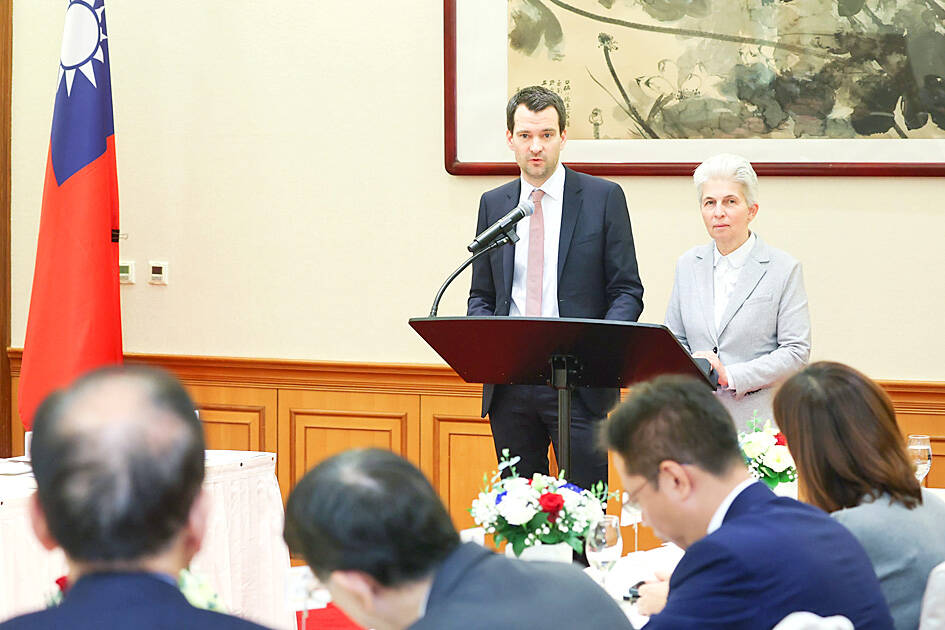A delegation of German Free Democratic Party (FDP) lawmakers led by German Bundestag Committee on Defense Chairwoman Marie-Agnes Strack-Zimmermann and party deputy chair Johannes Vogel arrived in Taiwan yesterday.
The visit is a gesture of German “solidarity” with Taiwan, they said.
Legislative Speaker You Si-kun (游錫堃) hosted a banquet to welcome the delegation.

Photo courtesy of the Taipei Photojournalist Society
“As a model of democracy against authoritarianism, Taiwan draws admiration from the world” because of its mature and stable democratic system,” Vogel said.
The FDP is a junior partner in Germany’s coalition government.
Vogel said that Taiwan’s peaceful and smooth transition to democracy was a “quite rare” event worthy of admiration.
The situation between Taiwan and China is complicated, and the FDP and the EU must support the “one China” policy, but the party is nonetheless supportive of Taiwan, he said.
Germany would like to send China a message that military intimidation is not acceptable, he said, adding that the trip is to “demonstrate Germany’s massive support for Taiwan.”
You said he was touched when the FDP in 2021 deleted mention of the “one China” policy from its election platform in an effort to support Taiwan.
Germany and the EU should engage with Taiwan more, he said.
You said he hopes that allies support Taiwan’s resistance against aggression and bullying, safeguard global peace and stability, and work to encourage China’s democratization.
German Minister of Education and Research Bettina Stark-Watzinger, also of the FDP, plans to visit Taipei in the spring, Agence France-Presse reported.
It would be the first visit by a member of the German Cabinet in 26 years.
The delegation is to meet with President Tsai Ing-wen (蔡英文) and other senior officials, the Ministry of Foreign Affairs said in a statement.
The members are scheduled to visit the Hsinchu Science Park and the National Human Rights Museum before departing on Thursday.
The Chinese Ministry of Foreign Affairs yesterday criticized the visit.
“The root of the Taiwan problem is precisely that of the law of the jungle — hegemonism, colonialism, militarism and nationalism. China suffered deeply from these behaviors throughout history,” Ministry of Foreign Affairs Wang Wenbin (汪文斌) told a news conference.
“Germany once experienced a profound and painful historical lesson in this regard,” he added.
Separately, a parliamentary delegation from Lithuania arrived in Taiwan yesterday morning.
Lithuanian Parliamentary Group for Relations with Taiwan vice chair Dovile Sakaliene on Sunday said on Facebook that Lithuania and Taiwan would discuss cybersecurity and geopolitical security challenges.
The invasion of Ukraine showed that the threats Lithuania and Taiwan face are real, and the two countries should “learn, unite, and act now,” she said.
Additional reporting by Lu Yi-hsuan

FIREPOWER: On top of the torpedoes, the military would procure Kestrel II anti-tank weapons systems to replace aging license-produced M72 LAW launchers Taiwan is to receive US-made Mark 48 torpedoes and training simulators over the next three years, following delays that hampered the navy’s operational readiness, the Ministry of National Defense’s latest budget proposal showed. The navy next year would acquire four training simulator systems for the torpedoes and take receipt of 14 torpedoes in 2027 and 10 torpedoes in 2028, the ministry said in its budget for the next fiscal year. The torpedoes would almost certainly be utilized in the navy’s two upgraded Chien Lung-class submarines and the indigenously developed Hai Kun, should the attack sub successfully reach operational status. US President Donald Trump

TPP RALLY: The clashes occurred near the Chiang Kai-shek Memorial Hall on Saturday at a rally to mark the anniversary of a raid on former TPP chairman Ko Wen-je People who clashed with police at a Taiwan People’s Party (TPP) rally in Taipei on Saturday would be referred to prosecutors for investigation, said the Ministry of the Interior, which oversees the National Police Agency. Taipei police had collected evidence of obstruction of public officials and coercion by “disorderly” demonstrators, as well as contraventions of the Assembly and Parade Act (集會遊行法), the ministry said in a statement on Sunday. It added that amid the “severe pushing and jostling” by some demonstrators, eight police officers were injured, including one who was sent to hospital after losing consciousness, allegedly due to heat stroke. The Taipei

NO LIVERPOOL TRIP: Taiwan’s Lin Yu-ting, who won a gold medal in the boxing at the Paris Olympics, was embroiled in controversy about her gender at that event Taiwanese boxer Lin Yu-ting (林郁婷) will not attend this year’s World Boxing Championships in Liverpool, England, due to a lack of response regarding her sex tests from the organizer, World Boxing. The national boxing association on Monday said that it had submitted all required tests to World Boxing, but had not received a response as of Monday, the departure day for the championships. It said the decision for Lin to skip the championships was made to protect its athletes, ensuring they would not travel to the UK without a guarantee of participation. Lin, who won a gold medal in the women’s 57kg boxing

The US has revoked Taiwan Semiconductor Manufacturing Co’s (TSMC, 台積電) authorization to freely ship essential gear to its main Chinese chipmaking base, potentially curtailing its production capabilities at that older-generation facility. American officials recently informed TSMC of their decision to end the Taiwanese chipmaker’s so-called validated end user (VEU) status for its Nanjing site. The action mirrors steps the US took to revoke VEU designations for China facilities owned by Samsung Electronics Co and SK Hynix Inc. The waivers are set to expire in about four months. “TSMC has received notification from the US Government that our VEU authorization for TSMC Nanjing